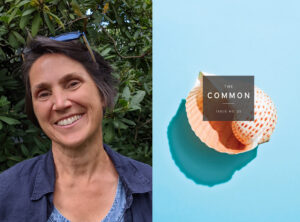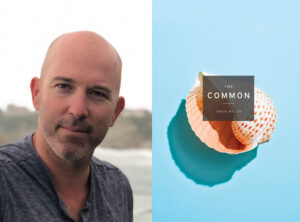New poems by our contributors.
Table of Contents:
POLINA BARSKOVA | Joy (translated by Valzhyna Mort, appears in both Russian and English)
ALDO AMPARÁN | Parable of the Haunted Cloak
TOM SLEIGH | A Dictator Walks into a Bar
MICHAEL DUMANIS | Ordeal
New poems by our contributors.
Table of Contents:
POLINA BARSKOVA | Joy (translated by Valzhyna Mort, appears in both Russian and English)
ALDO AMPARÁN | Parable of the Haunted Cloak
TOM SLEIGH | A Dictator Walks into a Bar
MICHAEL DUMANIS | Ordeal
Review by HANNAH GERSEN
Movie directed by AMALIA ULMAN

In Amalia Ulman’s debut feature, El Planeta, which she wrote and directed, Ulman and her real-life mother (Ale Ulman) play a mother and a daughter awaiting eviction. Ulman’s character, Leo (short for Leonor), has returned home after the death of her father, whose sporadic alimony payments barely supported her mother when he was alive. Leo is jobless and so is her mother, María. The two women spend most of the film in their narrow galley kitchen where the sunlight is abundant, and they aren’t tempted to waste money on electric lighting. Their refrigerator is empty, save for the tiny slips of paper María places in the freezer, each one bearing the handwritten name of an enemy. Atop the refrigerator are multiple glasses of water, which have something to do with María’s witchcraft—a practice that seems more like a distracting hobby than a coherent belief system. Leo sews bizarre yet fashionable clothing by hand, having sold her sewing machine for cash. They drink coffee, cook pasta, and, when they are really hungry, dress up in designer clothing and run up large bills in restaurants and stores, promising to pay later or claiming that Leo’s boyfriend is a local politician who will pick up the tab. They live in Gijón, a small city on Spain’s northern coast, a place hit hard by the global recession, with shuttered shops and empty tourist districts. It’s no wonder these two women are more at home in their delusions of grandeur.
Transcript: Carin Clevidence Podcast.
Carin Clevidence speaks to managing editor Emily Everett about her essay “Ghosts of the Southern Ocean,” which appears in The Common’s fall issue. In this conversation, Carin talks about how her experiences traveling to Antarctica on expeditions have changed over the years, and how that change comes through in her writing. She also discusses her 2011 novel The House on Salt Hay Road, and the novel she’s recently completed about an expedition to Antarctica.

Latifa Baqa’s gripping stream of consciousness short story “Adam’s Apple” is a highlight of Issue 21’s portfolio of fiction from Morocco. A feminist, human rights activist, and award-winning author, Baqa is interviewed by The Common interns Sofia Belimova, Olive Amdur, Adaku Nwokiwu, and Eliza Brewer. They discuss editing, the devil in the details, and countering the traditional expectation of the male gaze. Nariman Youssef translated the interview, as well as the original story. This is the first of two interviews conducted by the summer interns with Issue 21 contributors; the second will be with Abdelmajid Haouasse.

TC interns (TC): What inspired “Adam’s Apple?” Can you describe your process of writing and revising it?
Latifa Baqa (LB): The idea behind “Adam’s Apple,” like pretty much all ideas you may find in any of my fictional texts, began with a sentence. Meaning that one sentence preceded the idea, in a way not unlike how one note might resonate in a musician’s head before the rest of the tune. This is how it often happens: before I begin writing, a lone sentence rises up in my thoughts, for no obvious reason. I remember how this one stuck in my head for days: “We shouldn’t lay bare what we carry within us more than once.” The rest of the story followed from that sentence, beginning with a minor character who barely features in the narrative: Alzamourie, the neighborhood’s baker, who was a real person in the working class neighborhood where I was born and raised. To be more precise, one element that started making its way into the story was Alzamourie’s teeth. I just could never forget his teeth. It seems almost absurd, but I find more reassurance in the foggy arbitrariness of memory than in the clarity of conventional reality.

Iowa City, Iowa
For months I cared for my plant: watered it, brought in light, cleaned its jar. I noted with pleasure when new leaves began to sprout. The capillary green that unfolded overnight. I watched its roots mingle and spread, tracing against the glass. Don’t forget to watch over the plant. But when I returned from four days away, half of the leaves had yellowed. One fell off at my touch. I watched as a fifth leaf began also to lose its pigment.
Curated by ELLY HONG
This month’s round of Friday Reads features recommendations that span place and time: from interwar Greece to eighteenth-century London to a small-holding in present day Ireland. Read on to see what our Issue 22 contributors have been enjoying.
Recommendations: The Third Wedding by Costas Taktsis, The Question of Bruno by Aleksandar Hemon, Please by Christopher Meredith, Trivia: Or the Art of Walking the Streets of London by John Gay, and Savage Gods by Paul Kingsnorth
Ah, last day of the semester. The professor goes on a long walk into the winter woods near the Highland Park Reservoir, her pale face chapped with cold. She’s had one glass of wine.
OK two and a half. It’s perfect out here! The sky looks pink, sweet and pillowy as seen through bare black branches, and she’s touching as many trees as possible. This is a ritual that had been given to a character in one of the student stories she’d read this term. The story had moved the professor to tears, partly because the kid who wrote it was such a sincere person, so full of effort. He was Italian-Latvian, from South Philadelphia, used a flip-phone, suffered from schizophrenia and bipolar disorder, watched ancient re-runs of The Waltons on his laptop, and was the most brilliant of students—like nobody she’d ever taught before. A double major in writing and physics.
It’s that time of year again: bid for a personalized, handwritten postcard from your favorite author in The Common’s eighth annual author postcard auction! The personalization of the postcards makes them fantastic gifts, just in time for the holidays.
Join in on the fun this year for a chance to receive a postcard from New York Times-bestsellers, National Book Award-winners, Man Booker Prize finalists, and Pulitzer Prize-winners and finalists. In the past few years, authors have famously gone all out with their postcards: expect to receive anything from long letters to drawings and doodles to haikus.
Online bidding is open now. Participating authors include literary powerhouses and popular favorites such as Joy Williams, Maggie Shipstead, Alexander Chee, Anthony Doerr, David Sedaris, George Saunders, and Amor Towles. We also have writer-actor-comedians Phoebe Robinson and Jenny Slate, songwriters Jeff Tweedy (singer and guitarist of Wilco) and Craig Finn (frontman for The Hold Steady), and newcomers to the auction Kirstin Valdez Quade, Taylor Jenkins Reid, Aleksandar Hemon, and Lily King.
Winning bids are tax-deductible donations. All proceeds go to The Common Foundation, a registered 501(c)(3) nonprofit dedicated to publishing and promoting art and literature from global, diverse voices.
If you’re interested in supporting The Common but don’t want to bid, click here to donate.
Consider any listing on this page active. We will continue to post future opportunities here as they arise.

READING STAFF
The Common invites those interested in the world of literary publishing and passionate about contemporary fiction and nonfiction to apply to join our Reading Staff. Volunteer readers evaluate short works of fiction as well as essays; readers must be open-minded yet analytical. They must judge, quickly and thoroughly, the literary merit of each submission and the rightness of its fit for The Common given its sense-of-place mission. Readers are expected to review an average of 12 stories per week, which we estimate requires between 3 and 5 hours. We welcome undergraduate and MFA students as well as avid, sophisticated readers of all kinds, from all walks of life.
Interested applicants should be thoroughly familiar with work published in The Common. All pieces published in print and online content are available in our digital archive. Ideal candidates will have demonstrated skill and experience in critical reading and comprehension, and must be concise and articulate writers. Candidates must be able to read and review 12 pieces per week.
Please click here to express your interest in the reading staff position.
You will be asked for contact information as well as a CV and cover letter outlining why the position appeals to you and any relevant experience. The next step for qualified candidates is evaluating two test pieces.
Julian Zabalbeascoa speaks to managing editor Emily Everett about his story “Igerilara,” which appears in The Common’s fall issue. In this conversation from San Sebastián, Julian talks about writing stories set in Spain during the Spanish Civil War and the Basque Conflict. He also discusses his love of travel and his experiences running study abroad programs for college students, and what it’s like to teach The Common in his classes at UMass Lowell.
